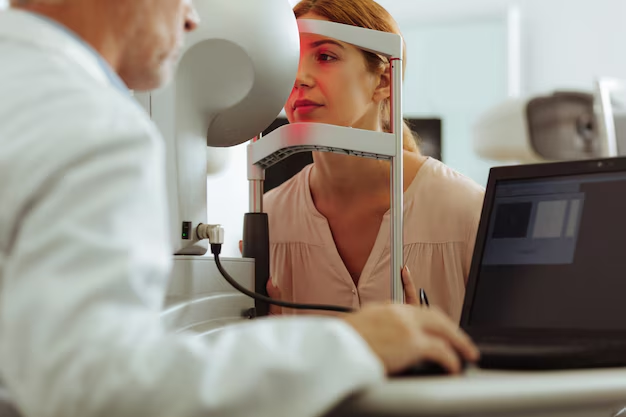Your Guide to Can You Have Cataract Surgery After Lasik
What You Get:
Free Guide
Free, helpful information about Cataract FAQ and related Can You Have Cataract Surgery After Lasik topics.
Helpful Information
Get clear and easy-to-understand details about Can You Have Cataract Surgery After Lasik topics and resources.
Personalized Offers
Answer a few optional questions to receive offers or information related to Cataract FAQ. The survey is optional and not required to access your free guide.
Cataract Surgery After LASIK: What You Need to Know
When it comes to eye health, advances in technology have made a wide range of surgical procedures safe and effective for correcting various visual impairments. LASIK, or Laser-Assisted In Situ Keratomileusis, is a popular surgery used to correct refractive errors like myopia, hyperopia, and astigmatism. On the other hand, cataract surgery is a common procedure to restore vision in individuals with cloudy lenses. But can you have cataract surgery after LASIK? Let’s delve into this question and explore all its facets to provide you with a comprehensive understanding.
Understanding LASIK and Cataract Surgery
What is LASIK?
LASIK is a widely-used laser eye surgery aimed at reducing or eliminating the need for glasses and contact lenses. During this procedure, a surgeon creates a thin flap in the cornea, then uses a laser to reshape it to correct refractive errors. The reshaped cornea allows light rays to focus more precisely on the retina, improving vision.
What is Cataract Surgery?
Cataract surgery involves removing the cloudy lens of the eye and replacing it with an artificial intraocular lens (IOL). This procedure is typically performed on an outpatient basis and has a high success rate in restoring clear vision. Most people undergo cataract surgery later in life as cataracts generally develop with age.
Can You Undergo Cataract Surgery After LASIK?
The Compatibility of LASIK and Cataract Surgery
The good news is that undergoing cataract surgery after LASIK is not only possible but usually successful. Both procedures target different parts of the eye—LASIK reshapes the cornea, while cataract surgery replaces the lens. Therefore, having had LASIK in the past typically does not complicate cataract surgery.
Factors to Consider
Despite the general compatibility, several factors should be considered:
- Accurate Measurements: The reshaped cornea can make it more challenging to measure the eye accurately for cataract surgery. The eye surgeon must have detailed knowledge of the previous LASIK procedure to select the correct lens implant.
- Communication with Surgeons: It's crucial to inform your cataract surgeon about your LASIK history. Sharing previous medical records can facilitate a more precise approach.
The Importance of Pre-Surgical Evaluation
A thorough pre-surgical evaluation is essential to determine the best course of action. This assessment includes measuring the eye's length and curvature to ensure the correct lens implant power. Post-LASIK eyes require special consideration due to altered corneal parameters.
Navigating Life After Both Surgeries
What to Expect Post-Surgery
After cataract surgery, many individuals experience improved vision quality, which may differ from their experience post-LASIK. Here’s what to expect:
- Visual Outcomes: Changes in visual acuity are common, and many people regain sharp vision without the dependence on corrective lenses.
- Adaptation Period: While recovery is relatively rapid, it might take some time for your vision to stabilize completely.
Follow-Up Care
Ongoing care is vital for maintaining eye health after surgery. Regular follow-up appointments ensure any complications are promptly addressed, and your vision remains optimal.
Potential Challenges and Solutions
Common Issues
While cataract surgery after LASIK is generally successful, a few issues might arise:
Lens Power Calculations: LASIK alters corneal shape, which can make choosing the right lens implant challenging. This requires precise measurement techniques.
Residual Refractive Error: In some cases, additional corrective measures may be necessary to achieve the desired visual outcome.
Solutions and Adjustments
- Advanced Imaging Techniques: Modern imaging technologies aid in obtaining accurate measurements.
- Targeting Outcome Accuracy: Surgeons may adjust the approach based on individual conditions and requirements to ensure the best possible results.
The Role of Lifestyle and Health
Maintaining Eye Health
Maintaining eye health is critical both pre- and post-surgery, especially when dealing with potential surgeries like LASIK and cataract extraction. Here are a few tips:
- Healthy Diet: Consume a diet rich in antioxidants and nutrients, such as vitamins A, C, and E, to support overall eye health.
- Regular Check-ups: Routine eye exams help spot issues early and monitor changes in vision.
Understanding Eye Aging
Aging influences vision changes significantly. Understanding these changes enables you to manage expectations regarding LASIK, cataract surgery, and beyond.
Summary Tips for Considering Cataract Surgery After LASIK
Here’s a concise list of key takeaways:
- 🌟 Inform Surgeons: Always inform your eye doctor about previous LASIK surgery.
- 🧐 Pre-Surgical Evaluation: Ensure thorough pre-surgical evaluations for precise lens power measurement.
- 👁️ Technological Aid: Advanced imaging tools play a crucial role in overcoming measurement challenges.
- 💡 Expectations Management: Know what to expect post-surgery to manage visual outcome aspirations.
- 🥦 Lifestyle Choices: Maintain a healthy diet and regular eye check-ups to support vision health.
- 🤝 Open Communication: Maintain open communication with your health care provider for optimal care.
Final Insights: Understanding Your Options
Undergoing cataract surgery after LASIK is a well-trodden path that many have successfully navigated. While the journey from LASIK to cataract surgery involves careful planning and expert guidance, the potential to restore and maintain clear vision is a worthwhile pursuit. By understanding the intricacies of each procedure and engaging with healthcare providers openly, you position yourself for the best possible outcomes and ongoing eye health.
What You Get:
Free Cataract FAQ Guide
Free, helpful information about Can You Have Cataract Surgery After Lasik and related resources.

Helpful Information
Get clear, easy-to-understand details about Can You Have Cataract Surgery After Lasik topics.

Optional Personalized Offers
Answer a few optional questions to see offers or information related to Cataract FAQ. Participation is not required to get your free guide.


